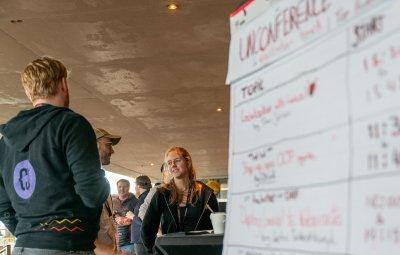When we read the title of this year’s keynote, we all thought this was just going to be some jokes, so quite honestly, some of us thought it perhaps was going to be a waste of time (professionally speaking that is; we all love jokes of course). It turned out it wasn’t actually about jokes at all. Ok, there were some – rather (intentionally) unfunny – jokes, but the key takeaway was much more interesting than anticipated.
Keynote by Cal Evans
Keynote: Which Way is the ElePHPant Pointed and other ElePHPant Jokes
by Cal Evans
If you think Oracle is evil, Microsoft invented evil
Cal Evans started off by talking about “how he got here”. It was an interesting story about a long gone era where Microsoft was ruling the world of the internet and where Cal hosted a rather revolutionary webshop. Just the fact that it worked, meaning that you could buy things on the internet in and of itself was groundbreaking. It was a time where he believed ASP was going to be “the thing”. There was one downside though, he had to pay for every user that was using his webshop on his Microsoft’s IIS-run host. For all the kiddos who are lucky enough to not know what IIS is, click on that link, if you’re interested, but you’ll never truly understand our pain. Sorry, I drifted off a bit there... To quote Cal “if you think Oracle is evil, Microsoft invented evil”. So he reached out and found other like-minded people who were more fond of the idea of sharing code. One of those bits of code he found was of some guy named Rasmus Lerdorf, you know, the guy who originally created PHP. So he started to play around with it. And the rest is history.
We’re speeding up the whole internet
Then Cal talked about “where we are now”. PHP became a matured language. Of course, it became an Object Oriented language, but we also have several tools to write better code, like code sniffers and whatnot. We “destroyed the gatekeepers”. It became possible to write something like Facebook in PHP, while on the other hand a 14-year-old script kiddie can also pick it up quite easily and create amazing things with it. And last but not least, since PHP 7 became faster, we’re “speeding up the whole internet”.
The third part of the inspirational keynote was about “where we’re going”. Cal mentioned that PHP 7.3 has had (only) 14 patches and that the issue queue has not that many bugs. Quite a difference with for example PHP 5.6 which had page-long change logs. Thàt is definitely proof of maturation. PHP 7.4 gave us another advancement in type hinting, but, and that’s in my opinion the neatest thing, it is not required. You can have vendor packages which use it, and still, you don’t have to (or the other way around). Another exhilarating thing is that long running processes become possible, which has always been a bit of an Achilles heel for PHP. Although they were technically also possible back in the nineties, a JIT compiler will speed them up. This makes it for example feasible to use it for machine learning. Ok, granted, it won’t be the most ideal tool for it, but PHP is truly a first class citizen among the other options.
To conclude Cal talked about the future of PHP, and about how absurd claims are that “PHP is dead” and really drove it home that the community is the most important aspect of it all. Of course, without the code, nothing would happen, “we would all just be a bunch of strangers on GitHub”. But, and that’s the essence, PHP didn’t become great because of beautiful code, but because a community gathered around it.
Related
This article is part of the PHPBNL20 blogs








